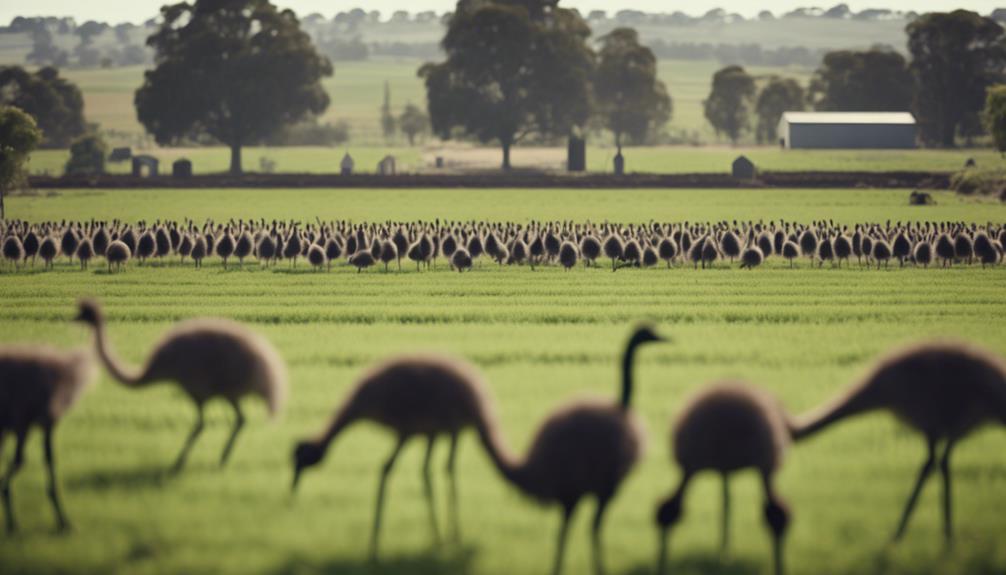
If you're looking to diversify your farm and explore new avenues for sustainable agriculture, integrating emus could be a game-changer. These unique birds offer a host of benefits that can enhance your farming practices in unexpected ways. From their natural abilities to their versatile products, there's a lot to consider when incorporating emus into your local farm. So, are you ready to discover how these fascinating creatures could revolutionize your farming experience?
Key Takeaways
- Provide spacious habitats with secure fencing for emus' safety and comfort.
- Ensure a balanced diet rich in proteins and nutrients to meet emus' nutritional needs.
- Regular health checks by avian veterinarians are crucial for emu welfare.
- Emphasize low-maintenance and cost-effective aspects of emu farming operations.
- Follow regulations for emu welfare, transportation, and record-keeping on local farms.
Benefits of Emus on Farms
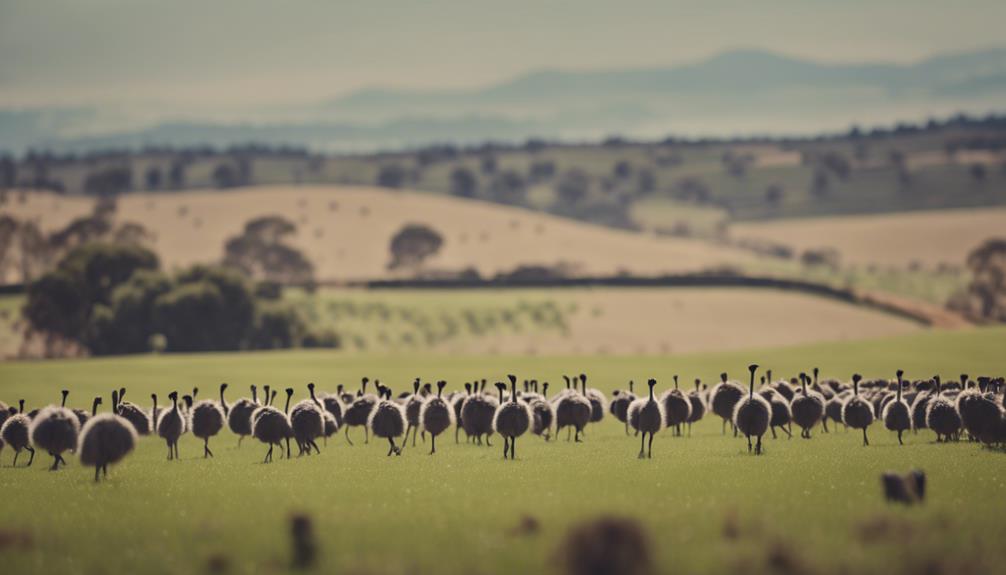
Why are emus beneficial to local farms and how can they enhance the farming ecosystem? Emus offer a range of advantages that can significantly benefit your farm operations. These majestic birds are known for their ability to control pests such as insects and rodents, reducing the need for harmful pesticides. Their strong, agile legs allow them to effectively forage for food, helping to manage weeds and overgrown vegetation in the fields. Additionally, emus produce nutrient-rich manure that can be used to fertilize crops, promoting soil health and productivity.
Integrating emus into your farm can also diversify your income streams. Emu meat is a lean, healthy protein source that's becoming increasingly popular among consumers. Their eggs, feathers, and oil are valuable commodities that can generate additional revenue for your farm. Furthermore, emus are low-maintenance animals that require minimal care and resources, making them a cost-effective and efficient addition to your farming ecosystem.
Incorporating emus into your farm operations can elevate your agricultural practices, improve sustainability, and boost profitability. Consider the myriad benefits that these remarkable birds can bring to your farm and seize the opportunity to enhance your farming ecosystem with the power of emus.
Emu Farming Basics
Emus, as livestock, require specific care and management practices to thrive on farms efficiently. To ensure successful emu farming, here are some key points to consider:
- Habitat Requirements: Emus need spacious areas to roam and run, with secure fencing to prevent escape.
- Nutritional Needs: A diet rich in high-quality grains and supplements is essential for emus to maintain optimal health.
- Health Monitoring: Regular health checks by a veterinarian and vaccination schedules are crucial for preventing illnesses.
- Breeding Considerations: Understanding emu breeding behaviors and providing suitable nesting areas are vital for successful reproduction.
Emus Vs. Other Livestock
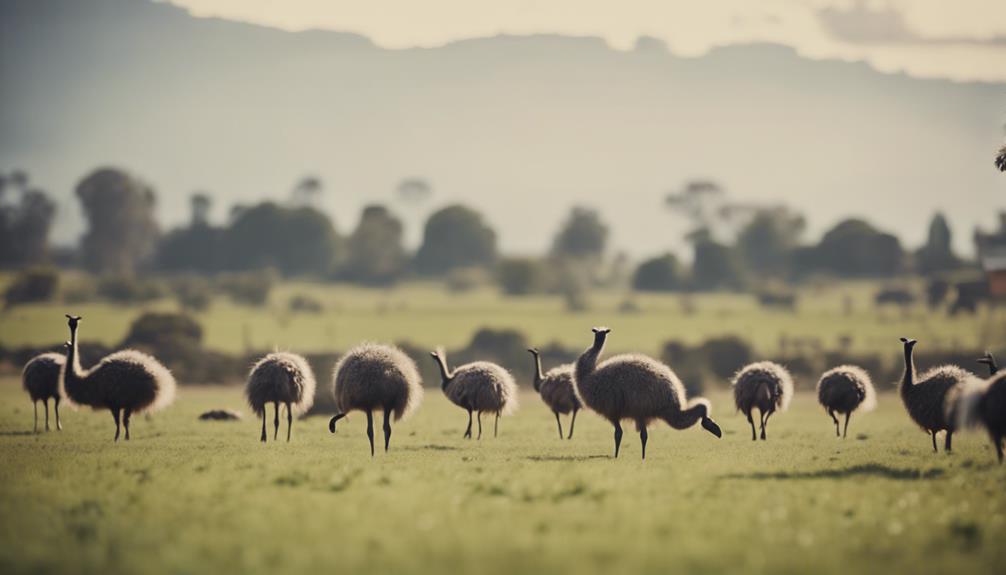
Comparing emus to other livestock reveals distinctive traits that set them apart in terms of behavior, dietary needs, and environmental adaptability. Emus exhibit a curious and independent demeanor, often requiring less hands-on care compared to traditional livestock. Their inquisitive nature can be harnessed for pest control purposes, making them valuable additions to a farm. Emus have a unique diet, needing a specialized feed that's low in starch and high in fiber, unlike many other livestock species.
Additionally, emus are remarkably adaptable to various environments, thriving in both hot and cold climates. Their ability to withstand harsh conditions makes them resilient and potentially more cost-effective to raise than some traditional livestock breeds.
In contrast, common livestock like cattle or sheep may require more intensive management and specific diets. While each type of livestock has its advantages, the distinct characteristics of emus make them a compelling choice for farmers looking to diversify their operations and explore new possibilities in sustainable farming practices.
Feeding and Nutrition Needs
Integrating emus into local farms necessitates a comprehensive understanding of their specific feeding and nutrition requirements to ensure their optimal health and productivity. Emus have distinct dietary needs that must be met to thrive in a farm environment. Here are key points to consider:
- High-Quality Diet: Emus require a diet rich in proteins, fibers, and essential nutrients to support their growth and development.
- Access to Fresh Water: Adequate water intake is crucial for emus to maintain hydration and aid in digestion.
- Supplementation: Emus may benefit from additional mineral supplements to ensure they receive all necessary nutrients for their well-being.
- Balanced Ratio: It's essential to provide emus with a balanced ratio of feed to prevent obesity or malnutrition, promoting their overall health and productivity.
Emu Housing Requirements

To ensure optimal health and productivity for emus on local farms, understanding and meeting their specific housing requirements is imperative. Emus require sturdy, predator-proof shelters that offer protection from extreme weather conditions. The housing structures should have ample space for the emus to move around freely, with enough room for them to stretch their legs and wings comfortably.
When designing emu housing, consider the flooring. Emus do best on soft ground or sand to prevent foot problems, so ensure the flooring is suitable for their sensitive feet. Additionally, proper ventilation is crucial to prevent respiratory issues, as emus are susceptible to respiratory infections in poorly ventilated spaces.
Emus are social animals and thrive in groups, so it's advisable to house them together in small flocks. Make sure there are separate areas for feeding, watering, and nesting within the housing to promote cleanliness and reduce stress among the emus. By providing well-designed housing that meets these requirements, you can create a safe and comfortable environment for your emus to flourish on your farm.
Health and Veterinary Care
Ensuring the health and well-being of your emus on the farm requires diligent attention to veterinary care. Here are some essential aspects to consider for maintaining the health of your emus:
- Regular Health Checks: Schedule routine check-ups with a qualified avian veterinarian to monitor the overall health of your emus.
- Vaccination Protocols: Follow a strict vaccination schedule to protect your emus from common diseases and ensure optimal health.
- Parasite Control: Implement a comprehensive parasite control program to safeguard your emus from internal and external parasites.
- Emergency Preparedness: Develop an emergency plan in collaboration with your veterinarian to address any sudden health issues promptly and effectively.
Emu Breeding Practices
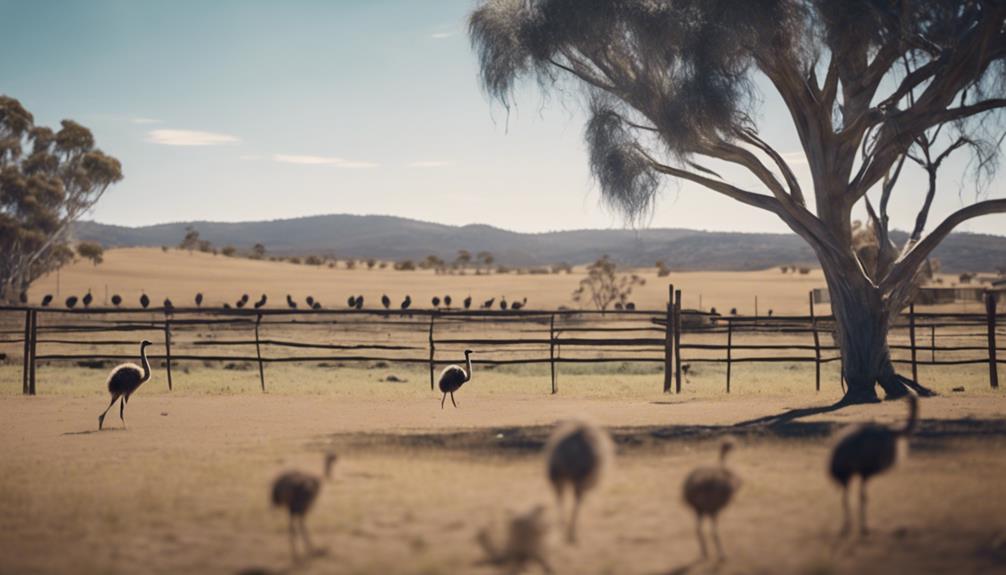
Implementing effective breeding practices is crucial for ensuring the long-term success and sustainability of your emu farm. To begin, carefully select breeding pairs based on desirable traits such as size, temperament, and genetic lineage. Conduct regular health checks to ensure optimal breeding conditions and minimize the risk of hereditary diseases. Monitor mating behaviors closely to track breeding success and ensure a healthy reproductive cycle.
Maintain detailed records of breeding outcomes, including hatch rates, chick health, and growth patterns. This data will help you make informed decisions for future breeding pair selections and genetic diversity. Implement a rotation system to prevent inbreeding and maintain the overall health and vigor of your emu flock.
Consider investing in specialized breeding equipment such as artificial insemination tools or brooding facilities to enhance breeding efficiency. Seek guidance from experienced emu breeders or agricultural experts to continuously improve your breeding practices and achieve maximum productivity. By adhering to these meticulous breeding protocols, you'll establish a robust foundation for the long-term prosperity of your emu farm.
Harvesting Emu Products
Selecting the right time for harvesting emu products is pivotal to maximizing the quality and value of your yield. To ensure you achieve the best results, follow these expert tips:
- Observe Physical Maturity: Harvest emu products when the birds have reached full physical maturity to guarantee optimal meat quality.
- Consider Feather Quality: Time your harvest to coincide with the molting season for the best quality feathers.
- Maintain Proper Nutrition: Ensure emus have been fed a balanced diet before harvesting to enhance the nutritional value of the products.
- Monitor Health Conditions: Regularly check the health of your emus and harvest products when they're in their prime condition to maximize value.
Marketing Emu Products

When marketing emu products, emphasize the unique nutritional benefits and sustainable production methods to attract discerning consumers seeking quality and ethical choices. Emu meat isn't only lean and high in protein but also rich in iron, zinc, and omega-3 fatty acids, making it a superior choice for health-conscious individuals looking to elevate their diet. Highlighting the environmentally friendly practices of emu farming, such as minimal water usage and low carbon footprint, can appeal to consumers who prioritize sustainability in their purchasing decisions.
Utilize sleek packaging designs and strategic placement in specialty stores or farmer's markets to convey a sense of exclusivity and luxury associated with emu products. Leveraging social media platforms and influencer partnerships can help expand your reach to a wider audience and create a buzz around the unique offerings of emu meat, oil, and feathers. By positioning emu products as premium, health-conscious, and sustainable options, you can captivate a powerful consumer base that values quality and ethical production methods.
Emu Farming Regulations
To ensure compliance and success in emu farming, understanding and adhering to specific regulations is crucial. Emu farming regulations are put in place to ensure the welfare of the emus and the safety of the consumers. Here are some key regulations to keep in mind:
- Housing Requirements: Emus need adequate space to move freely and express their natural behaviors. Ensure that your farm provides enough space per bird according to regulations.
- Health and Welfare Standards: Regular veterinary check-ups, appropriate nutrition, and access to clean water are essential to comply with health and welfare standards.
- Transportation Guidelines: When transporting emus, make sure to follow regulations regarding vehicle specifications, journey duration, and handling practices to minimize stress and ensure safety.
- Record-Keeping Obligations: Maintain detailed records of emu health, movements, and any treatments administered. This information may be required for inspections or audits to demonstrate compliance with regulations.
Financial Considerations
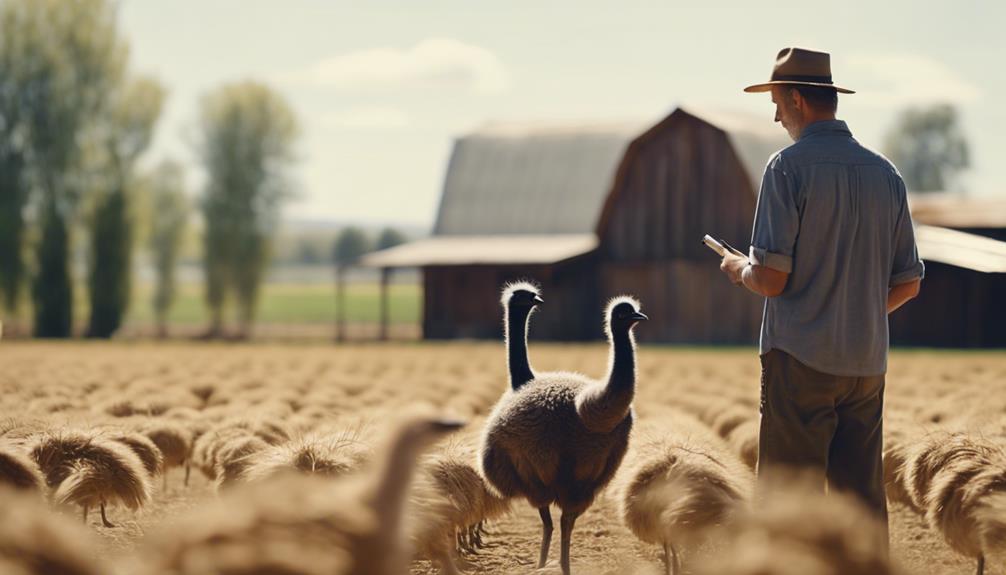
Considering the financial implications of integrating emus into your local farm is essential for long-term sustainability and profitability. Before diving into this venture, it's crucial to conduct a comprehensive cost-benefit analysis. Factor in expenses such as emu housing construction, feed costs, veterinary care, and fencing. These initial investments are vital for ensuring the well-being of your emus and the success of your farm.
Additionally, think about potential revenue streams. Emus can provide income through various means, including emu oil production, meat sales, and feather products. Research market demands in your area to gauge the profitability of these ventures. Keep in mind that the emu industry is niche but can be lucrative if managed efficiently.
Moreover, consider the long-term financial sustainability of integrating emus into your farm. Develop a detailed business plan outlining your goals, financial projections, and strategies for growth. Seek advice from financial experts or experienced emu farmers to make informed decisions and maximize your profits. By carefully evaluating the financial aspects, you can set yourself up for a successful emu farming venture.
Success Stories From Emu Farmers
Several emu farmers have achieved remarkable success by implementing innovative strategies and leveraging market opportunities in the industry. These success stories serve as inspiration for those looking to excel in the emu farming business. Here are some key highlights from successful emu farmers:
- Diversification: One farmer capitalized on the growing demand for emu oil in the beauty industry, expanding their product line to include various skincare products.
- Vertical Integration: Another farmer established their own processing facility, allowing them to control the entire production chain from breeding to final product, ensuring quality and maximizing profits.
- Export Market Penetration: A savvy farmer penetrated international markets by meeting stringent export requirements, tapping into a lucrative market and significantly increasing their revenue.
- Community Engagement: One farmer integrated their emu farm into the local community by offering educational tours and workshops, creating a loyal customer base and generating additional income streams.
These success stories underscore the potential for growth and prosperity in the emu farming sector when approached strategically and innovatively.
Frequently Asked Questions
Can Emus Be Trained to Interact With Other Farm Animals?
You can train emus to interact with other farm animals through consistent positive reinforcement, socialization, and supervised introductions. Emus are intelligent creatures capable of forming bonds with various species when introduced properly and with patience.
Do Emus Require Specific Environmental Enrichment on Farms?
Incorporate structures like shelters, water features, and varied terrain to provide optimal living conditions for emus on farms. Enrich their environment with natural elements to promote their well-being and ensure their welfare.
Are There Any Potential Risks of Predators Targeting Emus?
Predators pose a significant risk to emus, with animals like dingoes and foxes known to target them. Implementing robust fencing and monitoring systems is crucial to safeguarding emus from potential threats and ensuring their safety on farms.
How Do Emus Contribute to Sustainable Farming Practices?
Emus contribute to sustainable farming practices by providing natural pest control through their foraging behavior, reducing the need for chemical pesticides. Their manure also enriches the soil with nutrients, promoting healthier crop growth and overall farm sustainability.
Are There Any Unique Challenges in Integrating Emus Into Existing Farm Operations?
Facing challenges in integrating emus into existing farms? Embrace innovation. Strategize for efficient land use. Develop specialized shelters. Secure fencing. Plan for unique dietary needs. Emus bring diversity but require meticulous planning for successful integration into your operations.
Conclusion
In conclusion, integrating emus into local farms offers a multitude of benefits, including natural pest control, diversified income streams, and sustainable farming practices. By understanding their needs and following proper care guidelines, farmers can successfully incorporate emus into their operations.
From nutrient-rich manure to high-quality products like meat, eggs, feathers, and oil, emus bring value to the agricultural system. Embrace the opportunity to enhance your farm with these versatile and low-maintenance animals.


